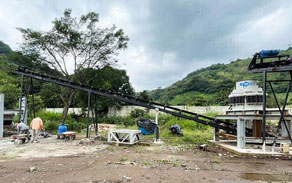
Discover the challenges of crushing granite and learn how to choose the best crusher for optimal performance.
Granite, with its exceptional hardness and density, is one of the toughest materials that crushers are designed to handle. However, despite its impressive resistance to wear and tear, it presents a series of challenges that require careful consideration when selecting the appropriate granite crusher machine. Crushing granite is not as simple as it may seem, and the wrong crusher can lead to excessive wear on equipment, inefficiency, and increased operational costs. Understanding the unique properties of granite and the specific challenges involved in crushing it is critical to selecting the most suitable crusher for the job. The wrong choice can severely affect the overall performance, uptime, and maintenance costs of the crusher.
Granite, known for its toughness and interlocking crystalline structure, presents unique challenges when subjected to crushing. These challenges not only affect the performance of the crusher but also influence the cost-effectiveness of the operation. It is important to understand these challenges before proceeding with any crushing process.
Granite’s primary characteristic is its hardness, typically measuring around 6 to 7 on the Mohs scale. This makes it significantly tougher than many other stones, including limestone and basalt. The hardness of granite means that crushers must be equipped with robust components capable of withstanding significant wear. Additionally, its abrasive nature accelerates the degradation of crushing surfaces, such as liners and hammers. This results in frequent maintenance and replacement, leading to increased downtime and costs if not properly managed.
Granite is an igneous rock, meaning it has an unpredictable and varied composition depending on where it is sourced. This variability can affect the crushing process, as some granite may contain tougher or more resistant mineral veins. Crushers that are not adjustable enough to handle these variations may struggle to produce a uniform product or experience mechanical failure. The inconsistency in material composition also requires crushers to handle both the harder and softer parts of granite in a way that does not result in equipment damage.
Choosing the best crusher for granite is critical to ensure efficient operation and cost-effectiveness. The right crusher will depend on several factors, such as the size of the granite, the desired output, and the specific properties of the granite being processed. Below are some of the primary crushers typically used for granite crushing and the factors that should influence your decision.
Jaw crushers are often the first choice for primary crushing of granite. Their ability to break down large chunks of material into manageable sizes makes them invaluable in the initial stages of granite processing. Jaw crushers can handle high volumes of material, but their efficiency is often limited by the hardness and abrasiveness of the granite. To get the best performance from a jaw crusher when crushing granite, it is essential to use a machine with a high-quality jaw plate that can withstand the abrasiveness of the material. Additionally, jaw crushers may need frequent adjustments to maintain optimal performance in the face of granite’s hard nature.
When it comes to secondary and tertiary crushing, cone crushers are often preferred for their ability to provide fine crushing of granite. With a more precise crushing action, cone crusher for sale offers a higher reduction ratio and can create more uniform product sizes compared to jaw crushers. However, choosing the right type of cone crusher is essential. For granite, cone crushers with heavy-duty components, such as reinforced bearings and a high-powered motor, are required to withstand the high forces involved. Furthermore, cone crushers are often more energy-intensive and can generate more heat, making regular maintenance essential to prevent overheating and subsequent failures.
The challenges involved in crushing granite are not insignificant. Its hardness, abrasiveness, and unpredictable nature can all contribute to inefficiencies and increased operational costs if the wrong equipment is used. Whether you opt for a jaw crusher, cone crusher, or impact crusher, it is essential to assess the material characteristics and select the most appropriate crusher that can handle the task with minimal wear and downtime. Understanding these factors will allow you to make an informed decision, ensuring optimal performance and cost-effectiveness in your granite crushing operations.
© 2024 Crivva - Business Promotion. All rights reserved.